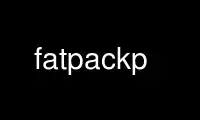
This is the command fatpackp that can be run in the OnWorks free hosting provider using one of our multiple free online workstations such as Ubuntu Online, Fedora Online, Windows online emulator or MAC OS online emulator
PROGRAM:
NAME
fatpack - Command line frontend for App::FatPacker
COMMANDS
pack
$ fatpack pack myscript.pl > myscript.packed.pl
A shortcut to do all the work of tracing, collecting packlists, extracting modules in
fatlib, then concatenating into a packed script - in one shot. If you need more detailed
controls for additional modules, use the following commands separately (see "RECIPES").
trace
$ fatpack trace [--to=trace-file|--to-stderr] [--use=MODULE]
myscript.pl
Compiles myscript.pl (as in "perl -c") and writes out a trace file containing every module
require()d during the compilation.
The trace file is called 'fatpacker.trace' by default; the --to option overrides this.
If you pass --to-stderr fatpack writes the trace to STDERR instead.
You cannot pass both --to and --to-stderr.
If the --use option specifies a module (or modules, if used multiple times) those modules
will be additionally included in the trace output.
packlists-for
$ fatpack packlists-for Module1 Module2 Module3
Searches your perl's @INC for .packlist files containing the .pm files for the modules
requested and emits a list of unique packlist files to STDOUT.
These packlists will, in a pure cpan-installation environment, be all non-core
distributions required for those modules.
Unfortunately most vendors strip the .packlist files so if you installed modules via e.g.
apt-get you may be missing those modules; installing your dependencies into a local::lib
first is the preferred workaround.
tree
$ fatpack tree fatlib packlist1 packlist2 packlist3
Takes a list of packlist files and copies their contents into a tree at the requested
location.
This tree should be sufficient to 'use lib' to make available all modules provided by the
distributions whose packlists were specified.
file
$ fatpack file
Recurses into the 'lib' and 'fatlib' directories and bundles all .pm files found into a
BEGIN block which adds a virtual @INC entry to load these files from the bundled code
rather than disk.
RECIPES
Current basic recipe for packing:
$ fatpack trace myscript.pl
$ fatpack packlists-for `cat fatpacker.trace` >packlists
$ fatpack tree `cat packlists`
$ fatpack file myscript.pl >myscript.packed.pl
COPYRIGHT, LICENSE, AUTHOR
See the corresponding sections in App::FatPacker.
Use fatpackp online using onworks.net services
